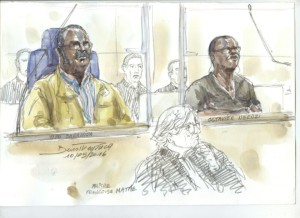 Yesterday, a Paris court convicted to life imprisonment two former Rwandan mayors for crimes against humanity and genocide over killing of 2,000 people.
Yesterday, a Paris court convicted to life imprisonment two former Rwandan mayors for crimes against humanity and genocide over killing of 2,000 people.
Octavien Ngenzi, 58, and his predecessor Tito Barahira, 64, were accused of ‘’massive and systematic executions’’ of Tutsis during the country’s 1994 genocide, in their village of Kabarondo, where some 2,000 people seeking refuge in a church were bludgeoned and hacked to death.
Ngenzi and Barahira have consistently denied the charges.
The eight-week trial has heard testimony depicting the two men as “supervisors” and “executioners” in the massacre.
“Ngenzi was the leader,” said prosecutor Philippe Courroye, who requested life sentences for the two men. Barahira was the “dreaded machete officer,” he added.
Among those seeking shelter at the church was Marie Mukamunana, who told the court how her seven children and husband were killed by grenades and machetes.
She recalled seeing former mayor Barahira “armed with a gun” and testified that Ngenzi was “supervising the massacre.”
Jean-Damascene Rutagungira – who lost 21 members of his family including his wife and children – also told the court he saw the pair encouraging the killers.
Ngenzi and Barahira’s lawyers had pointed to contradictory testimony delivered 22 years after the killings to argue that reasonable doubt exists over their role, portraying them as having been helpless to stop the chaos unfolding around them. They may appeal the verdict.
Ngenzi and Barahira were sentenced in absentia to life imprisonment by Rwandan people’s courts, known as “gacaca”, in 2009.
The conviction is the stiffest genocide sentence ever handed out by a French court. In 2014, former army captain Pascal Simbikangwa got 25 years in solitary confinement for genocide and crimes against humanity.
